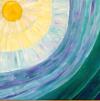Across a three-day period, a widow takes care of her son and attends to all kinds of “female duties”, but, very gradually, and despite the static camera, things start to fall apart. Perhaps I’m wrong, but I have the impression that responses to this film largely see it as being about the tedium and meaninglessness of repetitious domestic drudgery under the tyranny of oppressive “patriarchy”. But I’m not sure that this is a fair characterisation of the movie or the filmmaker’s intent.
Before saying something about that, though, it is worth pointing out that repetition does not equate to tedium or meaninglessness, and that one may well say, on the contrary, that life is repetition…and that there is no difference without repetition. All of life, whether biological or cultural, whether genetic, somatic, seasonal, annual, ritualistic, domestic or economic, involves and requires cycles and returns that form the very rhythm of the incessant unfolding of the adventure of life and existence. What’s more, many of life’s pleasures derive from these cycles and returns, and one might add that there are few if any pleasures and enjoyments that do not ultimately derive and depend upon the pleasures and enjoyments of repetition. To infer from a depiction of the repetitive character of life that “real life” consists in an escape from repetition is to forget and deny the critical and fundamental necessity of repetition in all of life.
Is this forgetting and denial what the filmmaker perpetrates? There is a story in this film, an incessantly unfolding narrative that occurs within, between and beyond the repetitions that so obviously characterise the bulk of what passes before the viewer’s eyes. In the unfolding of this story, Sylvain Dielman asks his mother about his own genesis, about how his parents met, about her attitude towards sex, and about her feelings about the connection between sexuality and love. All of this is dismissed by Jeanne as not worth asking, not worth talking about, not worth worrying about, and what we understand from this is clear enough: she has not asked herself these questions, or rather, she has suppressed them, and more particularly, suppressed her own sexuality.
Can we say that the reason for this suppression is patriarchal oppression, that she has not asked herself these questions simply because she could not, because she has been “structurally” prevented from formulating them? Can we say that it is caused by repression of the psychoanalytic kind, that to fulfil the function of wife and mother required her to sacrifice her own enjoyment? Perhaps. One might well see the final homicidal gesture as a reaction against all of these suppressions, oppressions and repressions. No doubt at some level it has to be.
But even if this is the case, it also seems clear that the filmmaker intends for the viewer to understand that the disordering agent in Jeanne Dielman’s universe, the new element that arrives and throws everything into disarray and renders impossible the continuation of old rituals and repetitions that have ceased to function, ceased to function in the way they may have used to function, that is, as pleasurable activities, is the surfacing or resurfacing of her own capacity for sexual pleasure and sexual desire. Once that is recognised, then it also becomes clear that we cannot just think of Sylvain’s acceptance of his mother’s role as provider and caregiver as some kind of crime on his part, perpetuating the intergenerational thread of patriarchy. Rather, he wants something else, he tries abortively to engage her in a way that will open up some other possibility, but her suppression of her own desire ultimately and catastrophically closes off all those possibilities. She can offer him nothing, just as she offers nothing to the one woman who tries to engage her in conversation (about her difficulty in deciding what meat to buy, what dinner to cook, and so on).
After all, if Jeanne is a character who represents a similar kind of woman to Chantal Akerman’s own mother, as I believe she attests, then we are entitled to think that the young Sylvain’s difficulties may well also have been the young filmmaker’s, and that what she is offering amounts to something like a critique of her mother, or her mother’s generation, provided that we do not forget that the only subjects and objects worthy of critique are those things we love, and that, in this way, critique is always in one way or another an expression of that love. The virtues of this film would then consist in the ambiguities, ambivalences and genuine questions that arise from this critical process, if we are right to construe it in this way.
Despite all of the above, however, it also has to be said that the long, slow repetitions on which this movie is built do require a patience that some if not most viewers will find unrewarded. And the fact that it seems to have so often been understood as merely an assault (which is not a critique) on the repetitions of domestic drudgery can perhaps be interpreted as demonstrating that some of the questions raised by this critical process were not pursued all the way to the bottom. But it also has to be admitted that that is an observation that arises at a distance of almost half a century from the film’s release: 1975 was a time when the preoccupation with sweeping away all of the supposed repressions and oppressions of “bourgeois culture” was still widely felt – before, in other words, it became clear that the much greater danger consists in the regressive sweeping away of all culture whatsoever.
Jeanne Dielman, 23 quai du Commerce, 1080 Bruxelles (1975)
- djross
- Posts: 1214
- 10 Ratings
- Your TCI: na
- Joined: Sun Apr 16, 2006 12:56 am

